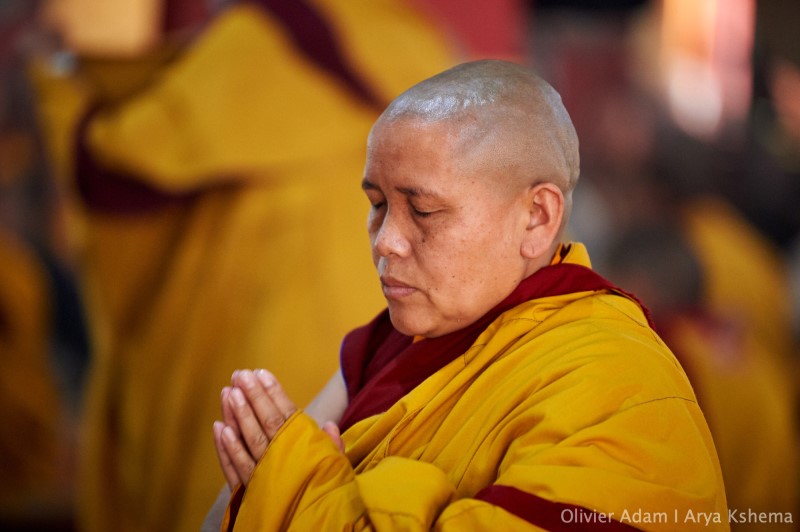法王新闻 | 2020年02月
第六届尼众辩经法会《解脱庄严论》第五堂课:利益众生,轻重的关键
Benefitting Others: The Balance between Benefit and Harm, His Holiness Teachings on Gampopa’s Ornament of Precious Liberation
འཕགས་མ་བདེ་བྱེད་མའི་དགུན་ཆོས་ཐེངས་དྲུག་པ། ༧རྒྱལ་དབང་༧ཀརྨ་པའི་གསུང་ཆོས། དྭགས་པོ་ཐར་རྒྱན། ཉིན་ལྔ་པ།
時間: 2020年2月18日 February 18, 2020
英文摘自:kagyuoffice.org
中文口譯:堪布羅卓丹傑
中文笔录:释妙竹

中文翻译现场视频
今天是第五天的课程,首先要问候所有在法会现场的,还有透过网路观看、聆听的这些法友们,本来今天是最后一天课程,但是更本来的计划呢,就是六天 的课程,所以我们其实是回到了最开始的计划,明天才是第六天,最后一天,到明天课程才结束。今天要讲的解脱庄严论的主文,还是跟昨天一样,所以 就不再多念一次。
■不能“固执己见”地利益众生
Bodhisattvas have only one aim and responsibility which is to benefit sentient beings. Every thought, every action, every breath
they take, and all their resources need to be directed to the benefit of sentient beings. They also need to know how to benefit sentient beings. Based
on listening, contemplation and meditation, you can gain experience; just following your own views and opinions might cause more harm than good
and can be driven by a selfish motivation.
昨天讲完了【饶益有情】的十一式,今天还是会继续讲解跟饶益有情有关的内容。为什么这次会花比较多的时间解释【饶益有情戒】这个部分呢?主要是
因为菩萨最主要的行持是『利益众生』,菩萨的每一个心念、行动,甚至是每一次的呼吸,都不是没有意义的。更不能是违背利他的。可以说,菩萨的一切
所思、所行、所拥有都是为了利益众生。要能成为这样的菩萨,如果就只是做些帮助众生的事情,这是远远不够的。更重要的是你必须要明白利益众生的
方法是什么,而且要精通这些方法。这就必须透过不断地闻、思、修,和在生活中不断地累积经验,你才可能会知道什么方法对于众生是最好的。
不然,如果自以为是的「这样做有帮助」「那样做有伤害」,自己在那边想,固执己见地,不仅无法帮助到众生,还有可能造成伤害。事实上觉得自己的想
法、认为才是对的,丝毫不顾他人的想法、感受的话,这本身就是一个自私的行为。
There are factors which can militate against your ability to help others such as your lack of skills, your environment, and health problems. Sometimes,
taking care of your own health, both physical and mental, becomes benefitting others. As the Way of the Bodhisattva says:
还有一种情况:如果是为了利益众生,口头上也这么说,但其实不自量力,无视周遭的现实情况,也不顾自己身心健康的状态,结果不吃、不睡的。这样也
是不行的。有的时候,照顾好自己的健康,无论是身体的健康,或心理的健康,照顾好的话,这本身就是在利益众生。就像《入菩萨行论》中也说到:
But when your strength diminishes,
身心俱疲时,
Put work aside to act again later.
暂舍为久继,
Once it’s well done, leave it behind—
事成应尽舍,
Look forward to the next and later.
续行余善故。
■「利益众生」的九种观察
There, are, therefore important considerations when we wish to work for the benefit of sentient beings. His Holiness listed nine:
讲的是同样的意思。今天接着呢,我们主要要讨论的就是:你在利益众生的时候,轻重的一些关键;还有适当的时机;时间的长短;如何能够带来利害等等情
况。这有叫做「利益众生」的九种观察。哪九种呢?
- Considering both oneself and others;
第一种是观察自他; - Considering the bounds of benefit and harm;
观察利害的大小; - The status of sentient beings;
观察众生的优劣; - The number of sentient beings;
观察众生的多寡; - Considering this and future lives;
观察此生与来世; - Considering the vows and non-virtues;
观察戒律与不善业; - Considering the pros and cons of giving;
观察布施之兴衰; - Considering sentient beings’ separate interests;
观察众生的种种欲心; - Considering the pros and cons for one’s own dharma practice.
观察自法的兴衰;
Considering both oneself and others
首先第一个是观察自他。我想简单地讲解一下。
If an action is beneficial, His Holiness commented, you should do it, but if it causes harm, you definitely shouldn’t do it. If it harms you
but helps others, you need to assess the situation intelligently and weigh up the good versus the bad. His Holiness used an illustration from the auto
commentary on Chandrakirti’s Entering into the Middle Way. If you plant a fruit tree, at first, when it is just a sapling, you need to really protect it. If you do
that, later when the trunk has grown, it will bear apples and everyone will be able to eat the fruit. Similarly, with a beginner bodhisattva, their bodhichitta
and their courage are like a young shoot that could be easily broken or die, and it needs protecting. Because it is the foundation for benefitting others,
protecting it is also benefitting others. Once it is stable, you do whatever you can to benefit others. Once you have achieved the bodhisattva levels, you work
only for the sake of other sentient beings.
如果说你直接或间接对自他有利的话,那么你就应该去做。相反,如果对于自他不仅没有利益,而且是有害处的话,就不可以去做。再来,如果对自己有利,对
他人有害的话,也不可以去做。所以,这句话的意思是说,这时候你更要有智慧做判断,视情况而定。到底谁重谁轻,哪一个是重要的,你都必须好好地去做判断。
就像《入中论》当中,『中论自视』中有提到:诸佛世尊如大药树,几无量果,则于嫩芽等,爱护我。这句话是说,如果我们要种植一棵药树,或者苹果树吧。
首先从树苗开始,你就好好呵护照顾,之后才能长得好,然后大家才能吃得到苹果。就像这个比喻,一个初学的菩萨,他的发心和勇气就像幼苗一样,是很脆弱
的,随时都可能消逝、坏灭的。(他在指Bamboo,读幼稚园菩萨班一年级老是自动退学。)所以一个初发心菩萨首先一定要好好
呵护他的发心和勇气,也就是好好守护好自己。因为自身就是利益众生的最重要资产。所以你好好守护自己的话,这就是在利益众生。
慢慢地成为了一个稳定的菩萨,到了胜解行的菩萨(就是『加行道』的菩萨),他会比较看轻「自利」,而尽量地以「利他」为重。再更进一步,如果到了登地
的菩萨了,他们就是完全一心地精进于各种「利他」的行持上了。这里你会看到,你要观察自他的情况,而行「利他」之事。
Considering the bounds of benefit and harm
第二是观察利害的大小。
Basically, His Holiness explained, if something is of great benefit to others and of little harm to oneself, you should do it. If it’s of great harm to you and
little benefit to others then there is no need to do it. If, however, the harm and benefit are equal, you need to do what is right in that situation at that
time. We also need to consider short-term benefit versus happiness in the long-term. “Our ancestors built such things as the Taj Mahal and the Potala
Palace in Lhasa and that is what they have left behind,” he commented. ”We are leaving behind a mountain of rubbish the size of Mount Meru for future
generations!” This is a crucial moment in the history of the earth and human beings have a responsibility to consider the future happiness of the planet.
If we have to choose between temporary benefit and ultimate happiness, we should be working for the latter.
一个菩萨无论他做什么样的行为,如果直接或间接对众生有大的利益的话,而对自己的伤害很微小的时候,那么就要毫无疑惑地去行利他的事情。如果对于
众生的利益很小,对自己的伤害是极大的话,那么不去做也是可以的。如果利害大小是相等的时候,那就视情况而定了。这里你会看到一个词“给予众生利乐”,
利益和安乐两个合起来叫「利乐」。「利」指的是「暂时的」;「乐」呢通常指的是「长远的、究竟的」。所以,举个例子来说,过去的古人为我们留下了
珍贵的遗产,像泰姬马哈陵、布达拉宫等等,但是反省一下我们自己,为后世的人带来什么呢?留下的就只是如同须弥山高广的垃圾。我们现在还在不断地
制造出这些垃圾。我觉得这是不负责任、也没有想得很远的一个情况。
所以我觉得我们应该要为了「利乐」,就是有时候要想得长远,不能只是自私地想到自己这一代人的快乐,要留给未来的世代一个干净、美丽的地球的话,
这是我们所有七十亿人的责任。尤其我觉得现在二十一世纪,真的是一个很重要的时候,因为未来到底是苦还是乐,是我们现在就要做抉择的重要关口。
就像《律仪二十颂》当中提到:为自或为他,无论苦与乐,有利皆当做,不做无利的乐。如果我们要在短暂的利益和究竟、长远的安乐上去选择的话,那么
长远的安乐是更重要的。我觉得我们不仅是要认识这样子,而且实际这样去做。要想得长远,同时所做的也是要长远地去做。我们不要搞错了什么该做,什么
不该做,然后要正确地做取舍。
Considering the status of sentient beings
第三是观察众生的优劣。
There are many examples of differences in levels: between humans and animals; in society between nobles and ordinary people; differences in the level
of realisations; between laypeople and bhikshus there are different levels of precepts; between sravakas and bodhisattvas there are different levels of
motivation. From our birth, we have experienced different degrees of closeness to others. However, from the perspective of bodhisattvas, there should
be no differentiation between close friends and enemies or sentient beings with whom they have no connection. All sentient beings on this earth, no
matter who they are, are equal in wanting to avoid suffering and attain happiness, and this should be the primary concern of bodhisattvas, whatever
their circumstances.
从文字上直接去解释的话,举例来说,人和动物在出身上就有优劣之分;凡夫和圣者在证悟上有优劣之分;居士和出家众在戒律上有优劣;还有声闻和菩萨在
发心上的优劣等等。这都是我们要做观察和决定的。当你在利益众生的时候,看到有这样子不同的优劣情况,而抉择要怎么帮助,或者要帮助谁。一般我们说,
一出生为人,很自然我们身边、周遭就会有这些人:一种是你熟悉的,一种是你不太熟悉的,还有一种是陌生人。这是很自然的,本来也不是个问题,是有
亲疏之分的。但是对于一个菩萨来说,是没有任何亲疏之分的。没有什么「这是我喜欢的」「那是我不喜欢的」,他对于尽虚空的众生也好,同处一室的几只
昆虫也好,他都能够一视同仁。因为对于菩萨来说,只要是生命,有呼吸的生命,都有着同等、离苦得乐的同样的权利和自由。他们的苦乐和自己的苦乐重量
是一样的,质量也是一样的,是没有任何差别的。所以菩萨无论做任何事情的时候,或者遭遇到任何苦乐的境界的时候,身为一个菩萨,他都不会忘记重要
的一点:就是「众生的苦乐」重量、质量是一样的。如果有准备时才想到,不得已时忘记了的话,这就不是一个菩萨。
However, there are many instances when we are confronted by a choice that we have to make on our own, a decision based on our experience,
awareness, listening and contemplation. A Chinese saying goes: A thousand days of military training are for the sake of going into battle once. In the
same way, we study the dharma and read a lot of texts, in order to be prepared, but if at the critical point, we cannot hold on to it, it’s as Milarepa said:
“The good is great in learning, but now is the profundity of knowing what to do and not to do.” We need to be able to use what we have learned.
然而回到现实面,当你真的在帮助众生、利益众生的时候,的确有很多情况是你马上要做决定的。要视情况而做调整、要思维的,不是那么简单,反正是对的就该做,不对的就
不该做,没那么简单,或许我们会询问很多很多人的意见,但是最终还是你自己要做决定,所以,你还是要透过自身的经验,譬如说闻、思、修的智慧才能够
做下决定的。所以利益众生不是那么容易的。不是像去菜市场买个菜那么简单,或者去餐厅选择说我要吃馒头或是别的。是选择亲人还是敌人;是考虑到大众的
利益还是个人的利益;是选择真理还是谬论;还是选择某个教派;需要选择上师还是选择护法;甚至到底我要买米还是买糌粑、吃米还是吃糌粑等等;你会看到
很多很多的决定。在中文当中,有这么一句话:「养兵千日、用在一时。」为什么要花那么多时间去训练、培养这些军人呢?就是为了用在一时。读了那么多佛法、那么多经论,紧要关头时如果没用上的话,那么就像密勒日巴说的一样了:不识甚深开遮法,博学多闻有何意。
(Bamboo批:Bamboo的体会是佛法就是帮助你在平时生活中做一些重要决定用的。像藏传佛教,从小或几十年的读佛学院,
真的就是浪费时间,效果跟国内那些读马列主义专业的研究生一样,让你自谋生路的话,活都活不下去。)真正到了紧要关头的时候,我们更是要谨慎,
要小心,要真的用上你所学的。这是最重要的。不然平时好像都很好,会说又很会讲,说得很好讲得很好,但真正关头上,要用的上才是重要的。
Considering the number of sentient beings
第四个是观察众生的多寡。
In this fourth consideration, it is a question of assessing whether an action will be beneficial to many but harm the few, in which case it is appropriate to
carry out the action. If it will harm many to help the few, it should not be done. If there would be equal harm and benefit, we need to choose skillfully
what to do. The choice may not be clear. His Holiness referred once more to environmental concerns. The situation in the world today has arisen because
human beings consider human happiness and control to be paramount so they kill other animals and destroy their habitats without a second thought. His
Holiness posed several questions, “If you have to choose between the lives of human beings and animals, which do you, choose? … Are you going to
forget about animals for the sake of humans or forget about humans for the sake of animals? Or are you going to look really carefully at the situation
and ignore the few for the benefit of the majority?”
一般来说,如果对多数人有帮助,而对少数人有害的话,那么这时候你就要选择对多数人有帮助,你可以这么去做。再来,如果对多数人有害,但是对少数人
有帮助的话,是不可行的。如果得到利益和受到伤害人的数量相同的时候,该怎么办呢?这时候就要用善巧、方便去做抉择了。事实上我们想一下,双方面都
得到利益而没有伤害的情况,几乎是不可能发生的。所以到头来你还是自己要用智慧做决定、做判断。
至于我们现在这个地球环境,很难过的一个情况就是现在可以说是人类统治了这个地球,但人类很自私,总是把自身的快乐和利益作为优先的考量,然后随意地去屠杀,
伤害其他的,砍啊、杀啊等等其他的昆虫和动物。对于这些动物的栖息地、大自然更是肆无忌惮地破坏。你会看到现在地球上几乎到处都有这样的一个情况的时候,
那么如果有一天,你自己在伤害人类和动物的性命这两方你要做抉择的话,你的选择会是什么?现在就应该想一想。如果我问你们这样一个问题,你会选择什么
呢?(Bamboo也肯定会选择毁灭大多数人类、保存动物。因为动物不可能毁掉整个世界。这大概就是为什么历史上像亚特兰蒂斯这样
拥有先进科技的高度文明无数次被彻底毁灭的原因。不毁灭它们、世界就会被毁灭。这也就是2020年毁灭性的灾难一个接一个
开启的原因。)你会因为人类而牺牲动物呢?还是为了动物而牺牲人类呢?还是为了大多数而牺牲少数呢?
The Karmapa cited the examples of the swine flu and avian flu epidemics when millions of animals and birds were killed in order to contain the virus. Is
this a case of ignoring the few for the many or choosing humans over animals? He then posited another dilemma: You are driving a car when the brakes
fail. You only have two choices, one way is full of pedestrians, and the other way has a small number of construction workers. If you choose the first, many
will die, but if you choose the second only a few will die. There is no time to think about it or take advice. What would you do in that situation?
如果你是这样讲:哦,我是为了大多数而牺牲少数。但是我们看看前阵子我们这种猪瘟、鸡瘟流行的时候,人类很紧张地把成千上万的这些猪啊、鸡啊都活埋、焚烧等等。这么样的行为到底是为了多数
而牺牲少数呢?还是其实是自私,为了人类而牺牲了动物呢?这是我们要想一想的。再来,我们可能编出一个例子:有一台车子失控,你就是这台车子的驾驶,
因为失控,所以刹车是没了的,前方只有两条路,停不下来,一条路上是很多人,一条路上是只有几个譬如说修路的工人吧,因为刹车失控了,你必须选择其中
一条,如果选择第一条,那么会死很多人;选择了第二条,只会牺牲几个人,那你会怎么做决定?而时间很短暂,你没时间去请问上师,或者请上师帮你算个
卦,没有这样的时间,你可能就只有几分钟,甚至几秒钟的思考时间,就要做决定。当然这是一个比较极端的例子,通常不太可能有这样的情况,我们也发愿
不要有这样的情况发生。但毕竟是个例子,它可以帮助我们做些思考。
These examples show how difficult it is to work for the benefit others. Bodhisattvas are meant to be as diligent as if their hair is on fire. “We usually sit
around drinking tea, chatting and boasting,” the Karmapa observed.
或许这样思考之后,你会知道利益众生不是一件容易的事情。首先,我们对于『利益众生』,其实并没有那种「如救头燃」的急迫感。我们慢条斯理地喝着茶、
晒着太阳,茶余饭后就跟别人在那边说着,炫耀着说:「我呢计划下个月就要到美国去了,美国某某中心请我去上课,所有这些课程都规划好了。」还在那儿
说着「啊,几个星期后,又有欧洲的弟子会来请我讲解《金刚总持祈请文》,除此之外,我其他时间倒是满空的,并没那么忙」,会这么说。
Milarepa said: “When I feel compassion deep within, it’s like all beings are burning in a pit of fire.” When he feels compassion deep in his heart, it’s as if
all sentient beings of the three realms are burning in a pit of fire and he asks what he can do to save them “in this very session, on this very cushion, at
this very time”, His Holiness commented, ”This is unbearable compassion.” Milarepa doesn’t have time to sit and relax. If we are truly committed to
benefitting others, we need to prepare our minds for any situation, and we need to begin to prepare ourselves now.
但我记得密勒日巴大师道歌说:「心底深处起悲时,我见三界诸众生,如处火宅、烘炉中。」你看到密勒日巴尊者真的内心深处升起大悲心的时候,他看到众
生是如处火宅当中,他会急着无法再一刻忍受的,不去救它们。他一定急迫的、马上的、现在的就去赶快把它们救出来。尊者是这样形容的。所以一个菩萨
是不可能悠悠闲闲在那儿过日子的(Bamboo批:昨天晚上刚发了篇《杭州封城的日子》:叽歪物价是不是大涨了,还在阳台捣鼓种菜。大宝今天就批评Bamboo
不像个菩萨了。Bamboo本来就一小混混,对整天忧国忧民的菩萨没概念。),不会的。我们现在就应该好好思维一下,应该用什么方式帮助众生,还有在实际帮助别人的时候,如果发生了上溯的一些
情况,你该如何应对,该如何做抉择等等。这些都是我们现在应该要做准备、去思维的。这就是「观察众生之多寡」、利益众生时要做的一些观察和思维。
■ 念《度母赞》时的祈愿和回向
The teaching concluded at this point.
我想今天大概就讲到这里。明天会再讲多一点。明天最后一天嘛,也是很多没讲完的就讲完。之前也说了,这一次要把第十一品都讲完。所以今天可能就少
讲一些,明天再多说一些。
His Holiness asked everyone to reassemble after the tea-break to recite the Praises of Twenty-One Taras in order to pacify all outer and inner obstacles
for themselves and all other sentient beings, for the teachings to flourish, for great beings to have no obstacles to their life or activities, for the sangha to
flourish and prosper, and for all the countries, especially China where COVID 19 has spread, that patients may recover quickly, and that the nurses and
doctors may be able to give medical treatment without any obstacles, and themselves be free of illness and mental suffering.
接下来大家喝完茶,接下来法会有课诵,念诵《二十一度母赞》等等,主要我们也透过念诵回向给自他一切众生各种内外的障碍能够平息,回向
佛教能够兴盛;也透过我们的祈愿回向佛教内所有的这些大德、大师们能够长寿住世(Bamboo批:大德在哪儿呢?)
,同时也回向僧团能够和合、能够兴盛(Bamboo批:直接说“财源广进”就行了。);尤其现在主要在中国国内发生
的,遍及到世界很多地方的新冠病毒能够很快的消失;患者也都能够赶快康复;还有尽力照顾患者的医护人员也都能够平安,他们的一切救护行为也都能够
顺利圆满,回向一切众生身心都能健康、快乐!所以当你们在念诵《度母赞》的时候,可以这样子发愿和回向。(Bamboo批:
那个《度母赞》念不念都一样,念了也不会有什么功德和作用,所以回向啥都无所谓。)
那么明天就会是最后一天了,所以其他就明天说了,今天就讲到这里,谢谢大家!
Youtube 视频
